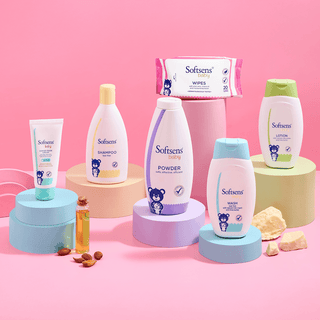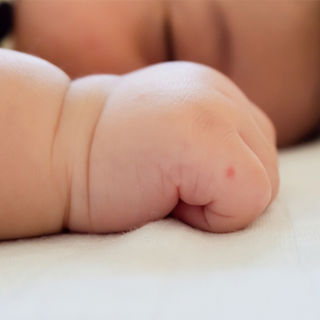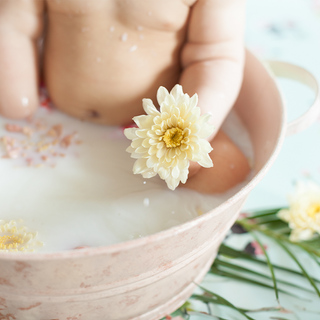
A common characteristic of parents across the world is the inclination to analyze and discuss their baby’s poop at length and in great detail – right from colour to consistency, frequency and quantity. After all, your baby’s poop can say a lot about their overall health and their eating habits. So, if you’re a new parent and you’re interested in learning about all the different types of baby poop, what to expect and what kind of warning signs you should look for, you’ve come to the right place. Let’s get started!
Firstly, it’s important to remember that a baby’s poop changes in texture and appearance over time. For example, a breastfed baby’s poop will look pretty different from the poop of a child who has just begun eating solids. The shade of your baby’s poop can also differ a lot from time to time, so let’s try and understand better why and when this happens.
Here’s all you need to know about the different kinds of baby poops you will most likely see as your baby grows:
-
Newborn Poop
A newborn baby’s poop is known as ‘meconium’ and it is blackish-green in appearance with a sticky tar-like consistency. This is because meconium is actually made up of all the things that your baby ingested while in utero, such as the amniotic fluid, mucus, bile, lanugo and other secretions. You’ll notice this kind of poop only for the first 2-3 days. If it continues to look this way even afterwards, you should speak to your doctor.
-
Breastfed Baby Poop
After the initial few days, your baby’s poop might be slightly greenish-black for a while as their digestive system begins to kick into motion. After that, if you are exclusively breastfeeding your baby, his or her poop will mostly be yellow in colour, almost like mustard. It could also be greenish-yellow in colour. In texture, it will be extremely soft, mushy and slightly grainy. Breastfed baby poop doesn’t have a very strong odor to it. In fact, some parents even think the smell is almost sweet.
-
Formula-fed Baby Poop
Formula milk doesn’t get digested quite as easily as breastmilk so your baby’s poop will probably look a little different as well. You can expect it to be yellowish-brown or tan in colour with slight green in it. Although it is slightly more formed than breastfed baby poop, it is still quite soft and paste-like in texture. The smell of formula-fed baby poop is a bit stronger than breastfed baby poop.
-
Baby Poop with Iron content
When you give your baby iron supplements, you might notice a dark green baby poop or one that is blackish colour. This is normal.
-
After you start feeding your baby solids
Once you introduce your baby to solids, the look AND smell of their poop is going to change again. This time, their poop will become brown in colour and become thicker but will still remain pretty mushy. Sometimes, you might notice small chunks of undigested food in your baby’s poop. While this is okay, if it happens all the time, then you should speak to your doctor to find out why. Sometimes, you’ll also notice that your baby’s poop is an odd colour such as purple, gray or orange, which is probably reflective of a food that they have eaten. This is not a reason to worry. If it helps, keep a food log of what your baby eats through the day so that you can figure out why your baby’s poop may look a certain way. (For example: lots of spinach might be the reason behind your baby’s green poop)
SIGNS THAT YOU SHOULD LOOK OUT FOR
Your baby’s poop is reflective of their health. Here are a few problematic signs to watch for when it comes to your baby’s poop.
- If your baby has Diarrhea, his or her poop will be watery and will appear either green, brown or yellow. This might be due to an infection and if it continues for more than a day, you should definitely consult your doctor, as your baby can get very dehydrated due to the constant stools.
- Sometimes, a change in baby’s food can lead to infant constipation, the signs of which are easy to spot. In this case, the poop is hard and looks like tiny little stones. You will also notice that your baby is straining to pass stools. If this persists and if you notice blood in your baby’s stools, consult your doctor.
- If your breastfed baby’s poop is bright green and frothy looking, it could be a sign that your baby is drinking more foremilk and not quite as much hindmilk that is rich in fat. To prevent this from happening, baby gets enough time on each breast. This could also be caused by improper latching.
- Have you noticed a slimy greenish substance in your baby’s poop? This is mucus in your baby’s poop and it usually happens to babies who drool excessively as it is the undigested mucus in their saliva. However, if this continues or you notice any other symptoms, it may point to an infection.
- If your baby’s poop is chalky white in colour, this is a sign of a liver problem and needs to be addressed immediately. ⦁ Consult your⦁ healthcare practitioner⦁ as soon as possible if you see this.
- Sometimes there are tiny specks of black blood in your baby’s poop. This happens when a baby digests blood while breastfeeding from Mom’s cracked, bleeding nipples. This is not a worry for your baby and is fairly common amongst Moms. Try and get some relief for your dry nipples. If the black specks in baby’s poop persist, it could be due to another problem and you should consult your doctor soon.
- If you see a thick black poop, it could be signs of a more severe problem and you should seek medical help immediately.
- Seeing bright red blood in your baby’s poop can be worrisome. If the blood is accompanied by regular stools, it could be due to food sensitivity or allergy. Try changing your baby’s diet and see what happens. If your baby has diarrhea and is getting bloody stools, then it could possible be a bacterial infection. You might also see a little blood if your baby is constipated and has had a lot of difficulty passing stools. All of these issues should be addressed as soon as possible.
How often should a newborn baby poop?
Babies that are breastfed typically poop right after every feed for the first few weeks. In comparison, formula-fed babies might poop 3-4 times a day. As time goes by, this number slowly reduces. After a few months, some babies might poop daily or some might even routinely poop every few days. As long as your baby’s poop is soft and not showing any major difference, your little one is fine. However, if you’re concerned that your baby’s poop routine is not what it should be, it’s always best to speak to your doctor and address your worries.
We hope this answers all your poop-related questions! If there’s something we haven’t answered sufficiently, leave us a comment or send us a message.



















